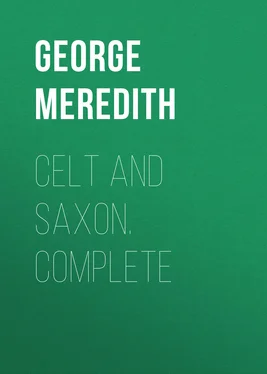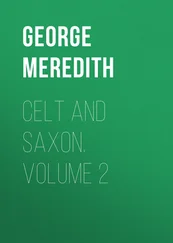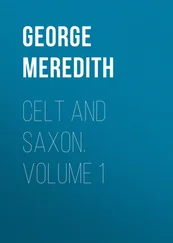George Meredith - Celt and Saxon. Complete
Здесь есть возможность читать онлайн «George Meredith - Celt and Saxon. Complete» — ознакомительный отрывок электронной книги совершенно бесплатно, а после прочтения отрывка купить полную версию. В некоторых случаях можно слушать аудио, скачать через торрент в формате fb2 и присутствует краткое содержание. Жанр: foreign_prose, literature_19, foreign_antique, на английском языке. Описание произведения, (предисловие) а так же отзывы посетителей доступны на портале библиотеки ЛибКат.
- Название:Celt and Saxon. Complete
- Автор:
- Жанр:
- Год:неизвестен
- ISBN:нет данных
- Рейтинг книги:5 / 5. Голосов: 1
-
Избранное:Добавить в избранное
- Отзывы:
-
Ваша оценка:
- 100
- 1
- 2
- 3
- 4
- 5
Celt and Saxon. Complete: краткое содержание, описание и аннотация
Предлагаем к чтению аннотацию, описание, краткое содержание или предисловие (зависит от того, что написал сам автор книги «Celt and Saxon. Complete»). Если вы не нашли необходимую информацию о книге — напишите в комментариях, мы постараемся отыскать её.
Celt and Saxon. Complete — читать онлайн ознакомительный отрывок
Ниже представлен текст книги, разбитый по страницам. Система сохранения места последней прочитанной страницы, позволяет с удобством читать онлайн бесплатно книгу «Celt and Saxon. Complete», без необходимости каждый раз заново искать на чём Вы остановились. Поставьте закладку, и сможете в любой момент перейти на страницу, на которой закончили чтение.
Интервал:
Закладка:
Patrick tried his art of fence with the absurdity by saying: ‘All but like a native.’
‘These Jesuits taught you the use of the foils?’
‘They allowed me the privilege of learning, sir.’
After meditation, Mr. Adister said: ‘You don’t dance?’ He said it speculating on the’ kind of gentleman produced in Paris by the disciples of Loyola.
‘Pardon me, sir, you hit on another of my accomplishments.’
‘These Jesuits encourage dancing?’
‘The square dance—short of the embracing: the valse is under interdict.’
Mr. Adister peered into his brows profoundly for a glimpse of the devilry in that exclusion of the valse.
What object had those people in encouraging the young fellow to be a perfect fencer and dancer, so that he should be of the school of the polite world, and yet subservient to them?
‘Thanks to the Jesuits, then, you are almost a Parisian,’ he remarked; provoking the retort:
‘Thanks to them, I’ve stored a little, and Paris is to me as pure a place as four whitewashed walls:’ Patrick added: ‘without a shadow of a monk on them.’ Perhaps it was thrown in for the comfort of mundane ears afflicted sorely, and no point of principle pertained to the slur on a monk.
Mr. Adister could have exclaimed, That shadow of the monk! had he been in an exclamatory mood. He said: ‘They have not made a monk of you, then.’
Patrick was minded to explain how that the Jesuits are a religious order exercising worldly weapons. The lack of precise words admonished him of the virtue of silence, and he retreated—with a quiet negative: ‘They have not.’
‘Then, you are no Jesuit?’ he was asked.
Thinking it scarcely required a response, he shrugged.
‘You would not change your religion, sir?’ said Mr. Adister in seeming anger.
Patrick thought he would have to rise: he half fancied himself summoned to change his religion or depart from the house.
‘Not I,’ said he.
‘Not for the title of Prince?’ he was further pressed, and he replied:
‘I don’t happen to have an ambition for the title of Prince.’
‘Or any title!’ interjected Mr. Adister, ‘or whatever the devil can offer!—or,’ he spoke more pointedly, ‘for what fools call a brilliant marriage?’
‘My religion?’ Patrick now treated the question seriously and raised his head: ‘I’d not suffer myself to be asked twice.’
The sceptical northern-blue eyes of his host dwelt on him with their full repellent stare.
The young Catholic gentleman expected he might hear a frenetic zealot roar out: Be off!
He was not immediately reassured by the words ‘Dead or alive, then, you have a father!’
The spectacle of a state of excitement without a show of feeling was novel to Patrick. He began to see that he was not implicated in a wrath that referred to some great offender, and Mr. Adister soon confirmed his view by saying: ‘You are no disgrace to your begetting, sir!’
With that he quitted his chair, and hospitably proposed to conduct his guest over the house and grounds.
CHAPTER III. CAROLINE
Men of the Adister family having taken to themselves brides of a very dusty pedigree from the Principality, there were curious rough heirlooms to be seen about the house, shields on the armoury walls and hunting-horns, and drinking-horns, and spears, and chain-belts bearing clasps of heads of beasts; old gold ornaments, torques, blue-stone necklaces, under glass-cases, were in the library; huge rings that must have given the wearers fearful fists; a shirt of coarse linen with a pale brown spot on the breast, like a fallen beech-leaf; and many sealed parchment-skins, very precious, for an inspection of which, as Patrick was bidden to understand, History humbly knocked at the Earlsfont hall-doors; and the proud muse made her transcripts of them kneeling. He would have been affected by these wonders had any relic of Adiante appeased his thirst. Or had there been one mention of her, it would have disengaged him from the incessant speculations regarding the daughter of the house, of whom not a word was uttered. No portrait of her was shown. Why was she absent from her home so long? where was she? How could her name be started? And was it she who was the sinner in her father’s mind? But the idolatrous love between Adiante and her father was once a legend: they could not have been cut asunder. She had offered up her love of Philip as a sacrifice to it: Patrick recollected that, and now with a softer gloom on his brooding he released her from the burden of his grand charge of unfaithfulness to the truest of lovers, by acknowledging that he was in the presence of the sole rival of his brother. Glorious girl that she was, her betrayal of Philip had nothing of a woman’s base caprice to make it infamous: she had sacrificed him to her reading of duty; and that was duty to her father; and the point of duty was in this instance rather a sacred one. He heard voices murmur that she might be praised. He remonstrated with them, assuring them, as one who knew, that a woman’s first duty is her duty to her lover; her parents are her second thought. Her lover, in the consideration of a real soul among the shifty creatures, is her husband; and have we not the word of heaven directing her to submit herself to him who is her husband before all others? That peerless Adiante had previously erred in the upper sphere where she received her condemnation, but such a sphere is ladder and ladder and silver ladder high above your hair-splitting pates, you children of earth, and it is not for you to act on the verdict in decrying her: rather ‘tis for you to raise hymns of worship to a saint.
Thus did the ingenious Patrick change his ground and gain his argument with the celerity of one who wins a game by playing it without an adversary. Mr. Adister had sprung a new sense in him on the subject of the renunciation of the religion. No thought of a possible apostasy had ever occurred to the youth, and as he was aware that the difference of their faith had been the main cause of the division of Adiante and Philip, he could at least consent to think well of her down here, that is, on our flat surface of earth. Up there, among the immortals, he was compelled to shake his head at her still, and more than sadly in certain moods of exaltation, reprovingly; though she interested him beyond all her sisterhood above, it had to be confessed.
They traversed a banqueting-hall hung with portraits, to two or three of which the master of Earlsfont carelessly pointed, for his guest to be interested in them or not as he might please. A reception-hall flung folding-doors on a grand drawing-room, where the fires in the grates went through the ceremony of warming nobody, and made a show of keeping the house alive. A modern steel cuirass, helmet and plume at a corner of the armoury reminded Mr. Adister to say that he had worn the uniform in his day. He cast an odd look at the old shell containing him when he was a brilliant youth. Patrick was marched on to Colonel Arthur’s rooms, and to Captain David’s, the sailor. Their father talked of his two sons. They appeared to satisfy him. If that was the case, they could hardly have thrown off their religion. Already Patrick had a dread of naming the daughter. An idea struck him that she might be the person who had been guilty of it over there on the Continent. What if she had done it, upon a review of her treatment of her lover, and gone into a convent to wait for Philip to come and claim her?—saying, ‘Philip, I’ve put the knife to my father’s love of me; love me double’; and so she just half swoons, enough to show how the dear angel looks in her sleep: a trick of kindness these heavenly women have, that we heathen may get a peep of their secret rose-enfolded selves; and dream ‘s no word, nor drunken, for the blessed mischief it works with us.
Читать дальшеИнтервал:
Закладка:
Похожие книги на «Celt and Saxon. Complete»
Представляем Вашему вниманию похожие книги на «Celt and Saxon. Complete» списком для выбора. Мы отобрали схожую по названию и смыслу литературу в надежде предоставить читателям больше вариантов отыскать новые, интересные, ещё непрочитанные произведения.
Обсуждение, отзывы о книге «Celt and Saxon. Complete» и просто собственные мнения читателей. Оставьте ваши комментарии, напишите, что Вы думаете о произведении, его смысле или главных героях. Укажите что конкретно понравилось, а что нет, и почему Вы так считаете.












